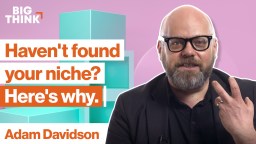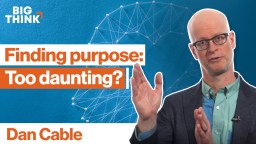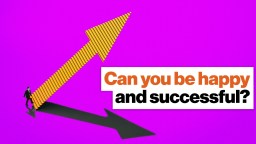potential
The number of PhDs has been exceeding the available academic positions since as early as the mid-1990s.
What is human dignity? Here’s a primer, told through 200 years of great essays, lectures, and novels.
The color of toys has a much deeper effect on children than some parents may realize.
▸
6 min
—
with
Psychologists W. Keith Campbell, (Ph.D.) and Carolyn Crist explain why narcissists rise to power and how to make sure your support is going to someone making effective, positive change.
SEAL training is the ultimate test of both mental and physical strength.
▸
16 min
—
with
Can thinking about the past really help us create a better present and future?
Most people don’t know what they’re passionate about.
▸
7 min
—
with
Flow Research Collective COO Rian Doris explains how to harness the power of your nervous system to find your flow during a pandemic.
Removing the pressure of finding your “dying passion” makes it easier to connect with the “why” of your work.
▸
3 min
—
with
It takes more than a good idea to land a shark as a business partner.
▸
5 min
—
with
How reframing your emotions and changing your daily behavior can help you save money.
60 is the new 30, says Melanie Katzman. Embrace your age and the benefits that come with it.
▸
2 min
—
with
Bishop Omar Jahwar explains that before mentors can inspire others, they have to be inspired themselves.
▸
4 min
—
with
New research suggests that we should think twice before asking for input from a very wide range of people.
Sisu is an ancient concept that is an integral part of Finland’s national character.
The fierce debate over participation trophies ignores a crucial fact: Children aren’t idiots.
Two questions hold the key to breaking through your limitations, says David Goggins.
▸
5 min
—
with
The countdown continues! This is the 9th most popular video of 2018 — and great fuel for starting a new year.
▸
11 min
—
with
It’s not about the resolution but about how your mind tackles the problem.
Can you be happy and successful? Dark horses show us how it’s possible.
▸
6 min
—
with
The FIRE movement believes frugality is key to retiring in your 30s; others think the movement is about privilege more than prudence.
Are you living at just 40% of your potential? Here’s how to tap into your inner Navy SEAL.
▸
11 min
—
with
Universal Basic Income an expensive system to be sure, but social justice commentator Eva Cox argues that the societal returns will be worth the investment.
























